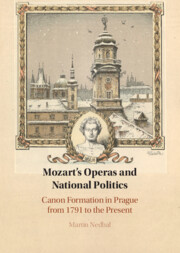Book contents
- Mozart’s Operas and National Politics
- Mozart’s Operas and National Politics
- Copyright page
- Dedication
- Contents
- Figures
- Tables
- Musical Examples
- Preface
- Acknowledgments
- Introduction
- Part I Authenticity and Ethnicity
- 1 Werktreue, Patriotism, and Nationalism in Prague Productions of Mozart’s Operas
- 2 Mozart and Ethnic Identity
- Part II Monuments and Politics
- Part III Translations and Adaptations
- Bibliography
- Index
2 - Mozart and Ethnic Identity
from Part I - Authenticity and Ethnicity
Published online by Cambridge University Press: 27 July 2023
- Mozart’s Operas and National Politics
- Mozart’s Operas and National Politics
- Copyright page
- Dedication
- Contents
- Figures
- Tables
- Musical Examples
- Preface
- Acknowledgments
- Introduction
- Part I Authenticity and Ethnicity
- 1 Werktreue, Patriotism, and Nationalism in Prague Productions of Mozart’s Operas
- 2 Mozart and Ethnic Identity
- Part II Monuments and Politics
- Part III Translations and Adaptations
- Bibliography
- Index
Summary
This chapter shows how ethnic concepts became prominent in Bohemian debates about Mozart in the late nineteenth and early twentieth centuries. The chapter first explores the writings of Mozart’s first biographer Franz Xaver Niemetschek to show that around 1800 regional identity in Prague was dominated by the ambiguous concept of Bohemian patriotism. With the rise of Czech and German ethnic nationalism in the ensuing decades, Prague’s critics and musicologists mined Mozart’s operas, as well as works by his eighteenth-century contemporaries and predecessors, such as Stamitz and Gluck, for inherent qualities associated with Czech and German-Bohemian cultures, especially folk music. In the 1930s, Czech and German-Bohemian musicologists used racial criteria to prove that Gluck’s and Mozart’s music was inherently Czech or German (or Sudeten German, as many Czechoslovak Germans identified themselves by then). These ethnocentric preoccupations were further emphasized by Czech Marxist musicologists in the post–World War II period.
Keywords
- Type
- Chapter
- Information
- Mozart's Operas and National PoliticsCanon Formation in Prague from 1791 to the Present, pp. 59 - 96Publisher: Cambridge University PressPrint publication year: 2023

